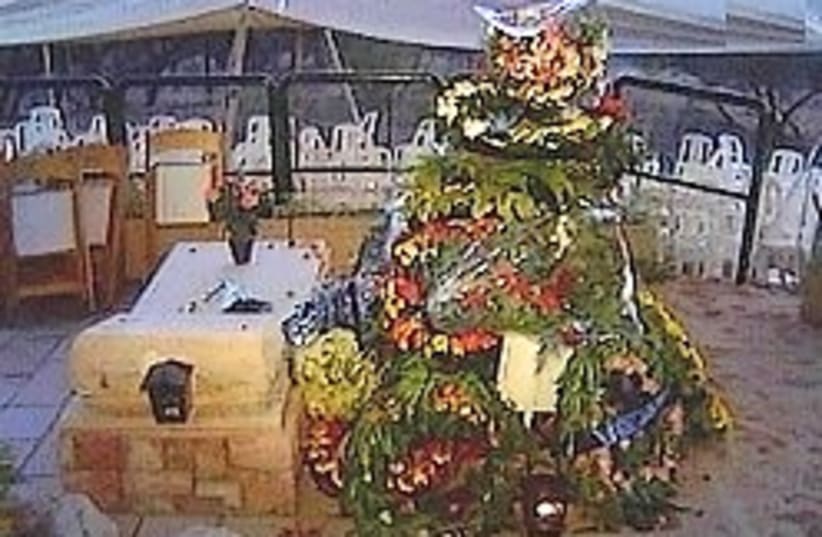It is rare to hear Israelis expressing emotion in public, a fact that gives heightened significance to the nationwide outpouring of grief and love in the wake of the tragic death of 20-year-old Assaf Ramon on Sunday.
The grave of Capt. Assaf Ramon is seen to the right of his father's grave, Ilan Ramon.Photo: Channel 2
"The son of the Ramon family was the son of us all," said President Shimon Peres, echoing sentiments heard from leaders, soldiers and ordinary Israelis in the past two days.
It is the second time the Ramon family has sacrificed on the altar of our national freedom. Surely this is too high a burden for any one family to bear.
At just 14, when his father Ilan was swept up in the explosion of the space shuttle Columbia in the Texas sky, Assaf Ramon learned in the most horrific, intimate way the cost of freedom and the dangers of a life lived for one's country.
It is that intimacy that marks the outpouring of grief and support now. Neighbors lit candles on the sidewalk outside the Ramon home. School friends and squadron comrades stood at the family's side, and insisted on carrying Assaf's body to the grave.
NEARLY EVERY Israeli has had a personal experience of loss in Israel's struggle to be born and survive. The shared pain felt nationwide is not only national, but also deeply personal. Six years after the loss of Ilan, today Assaf and his mother Rona are once again stand-ins for someone specific in every Israeli's mind.
Thus it was not surprising to hear from Prime Minister Binyamin Netanyahu that "the loss of both [Ilan and Assaf] brings with it unbearable pain. There is no consolation for Rona and the Ramon family, no consolation for the people of Israel. There are only tears."
While speaking of Assaf Ramon, the prime minister was doubtless also thinking a little of his own brother Yoni, killed while overseeing the astonishing rescue of hostages in Entebbe in 1976.
A personal familiarity with sacrifice and loss is, in this country, not the domain of the poor or the disenfranchised. From 1949, when the Israeli delegation to the Rhodes cease-fire talks with Egypt noted that few members of the delegation - including Moshe Dayan and Yigal Yadin - had come through the War of Independence without losing a relative, to the 2006 death of author David Grossman's son Uri in the Second Lebanon War, Israel's leaders and elites have paid the price for Israel's freedom as much as anyone. Historical need has produced in Israel a different aristocracy - an aristocracy of commitment and sacrifice, an absolute meritocracy based on the willingness to give.
Assaf Ramon, following in the footsteps of his father but remarkable in his own right, represented a tradition of service and commitment that is vital to our very survival. Israel has told the world: The Jews will not turn to others for their defense, and the Jews are not defenseless. We have made that statement knowing there is no alternative and knowing the price, which can come in battle as in a training accident.
THOSE WATCHING from afar would be mistaken to interpret the current nationwide grief over the death of one young man as weakness. By extension, even some of Israel's friends are often mystified at the country's apparent obsession with the fate of our young soldiers, and baffled by the lengths we go to retrieve them - or even their bodies - from enemy hands. But these are all of our soldiers, and they serve to protect all of us.
As a nation largely composed of the children and grandchildren of refugees, our sense of collective fate is widespread and profound, deeply and firmly embedded in our social fabric, though it is rarely discussed and hard to see in ordinary times. But at moments of tragedy, when the sacrifice demanded of our families is brought painfully to the fore, we face the enormity of our dependence on each other, the cost of our freedom.
Peres, in his eulogy for Assaf on Monday, told Rona Ramon that all Israelis are with her in this hour: "Our broken heart is with you in every tear that falls, in every memory that causes you to smile, in every moment of stinging pain," he said.
Rona Ramon's pain is personal and indescribable, but it is also shared in part with all Israelis; her sacrifice was for all of us.
| More about: | Benjamin Netanyahu, David Grossman, Shimon Peres, Yigael Yadin |
